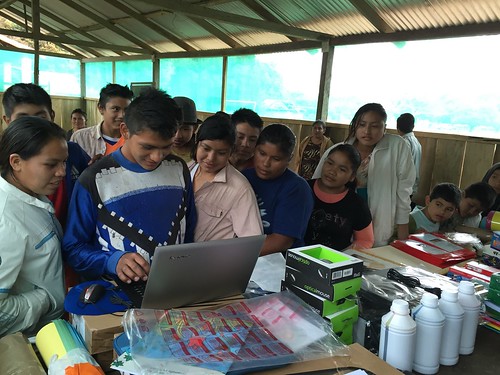Alma is starting a new education project in the very remote community of Monte Cristo. Monte Cristo is in the San Andres district of Bolivia. 22 families live in Montre Cristo. Their main economic activities are subsistence agriculture and fishing. There is no access to running water or electricity. In Monte Cristo, we are implementing a two pronged project in the area’s only secondary school with the goal of improving students academic abilities by providing students with computer science, mathematics, and physics classes.
To do so, we are hiring and training a teacher to work during regular school hours as a math and physics teacher and during the afternoons as a computer science teacher. In both roles, our teacher will implement innovative teaching methods focusing on mathematical reasoning, reading comprehension, critical thinking, and creativity. In order to best implement computer classes, we will be creating a computer lab in the community with the help of materials and solar panels from the Municipality of San Andres and labor from the community.
Monte Cristo is home to 22 families whose main economic activities are subsistence agriculture and fishing. There is no access to running water or electricity.
In 2017 our project continues. This year the students must develop social-productive projects. This exercise promotes critical thinking, creativity, social/personal and environmental values to illuminate concepts behind program content. Classes are held Monday to Friday during school hours and in the afternoons after school. There are 22 secondary school students aged 12-18 years old enrolled.
Alma inputs:
- Teacher (1)
- Technical and academic materials
- Internet service fee
- Project coordination and training
- Budget: U$10,000
Monte Cristo community inputs:
- Construction and provision of classroom
- Desks, chairs and bookcases
- Internet antenna
- Solar panels
- Accommodation for our teacher
- Student lunches
- Meeting attendance
- Home strategy implementation
- Project coordination
Indicators of Success:
1. Student attendance
2. Academics – computer skills, mathematical reasoning, communications
3. Creativity – divergent thinking, originality
4. Critical thinking – analysis, evaluation, justification of opinions
5. Values and resilience
6. Hours invested per child
7. Parental engagement – attendance, contreparte, home strategy, capacity
8. Ancillary benefits
9. Implementation of teaching methods – Alma teachers, State teachers

